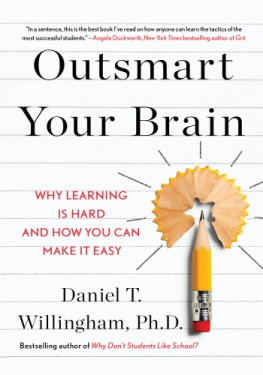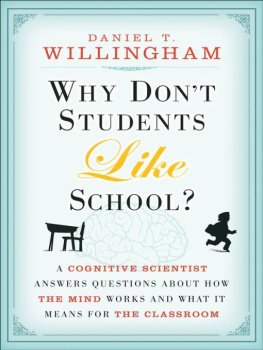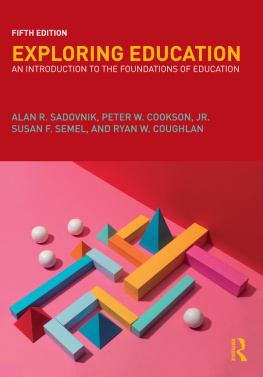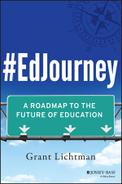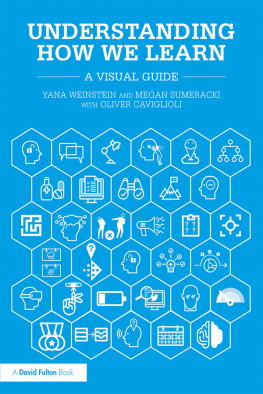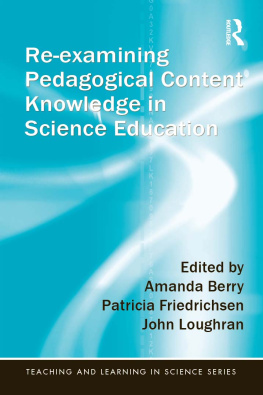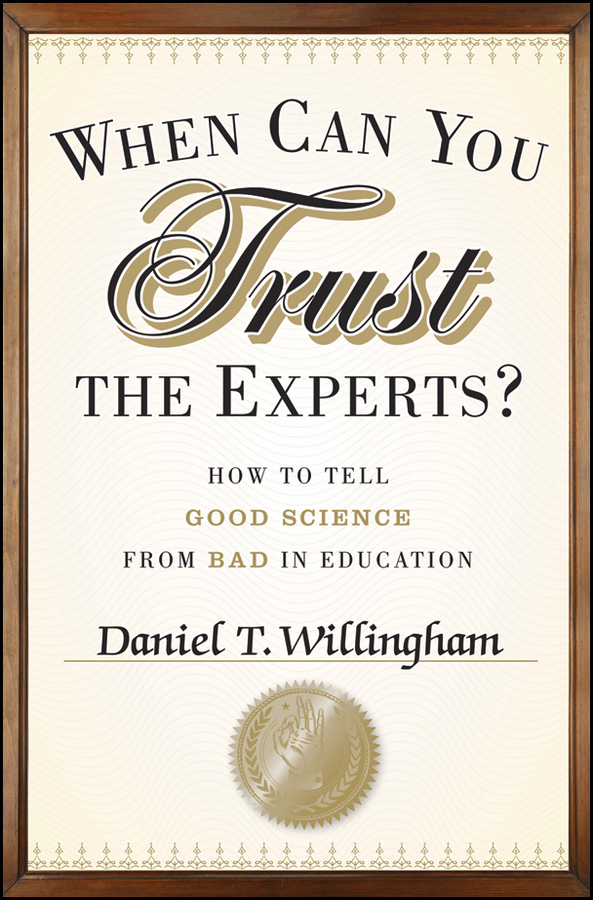Contents
More Praise For When Can You Trust the Experts?
As a parent, when it was time for my daughter to start school I was overwhelmed by all the claims made about education and then appalled by the level of pseudoscience in the various claims and theories about the best educational method. I didnt know where to turn because the experts seemed to contradict one another. I wish I had Daniel Willinghams guide for the educationally perplexed When Can You Trust the Experts? when I was trying to sort through the maze of ideas. He has succinctly cut through the obfuscating jargon to reveal what we know and do not know about education. A must-read for parents, educators, and policy makers alike.Michael Shermer, publisher, Skeptic magazine; monthly columnist for Scientific American ; author, The Believing Brain
There are a lot of proposals on how to improve education, but too often the current heated debate is fueled by preconceived opinions rather than hard evidence about what actually works. Dan Willingham is determined to change that. In this carefully reasoned, important book, he teaches us how to thoughtfully evaluate educational research in the sincere belief that the debate will benefit from more light and less heat.Joel Klein, CEO Education Division, News Corporation; former chancellor, NYC public schools
The phrase the research says... gets used to justify just about every practice in contemporary education, including those for which theres very little real empirical evidence. So those who want classroom practice to be informed and improved by data may find themselves asking, What does the best research really tell us? and, How do you differentiate the real thing from pseudo-science? Fortunately, Dan Willinghamfor my money the most insightful and readable cognitive scientist in the fieldhas written a book that can help teachers, and just about everyone, understand the difference.Doug Lemov, author, Teach Like a Champion
Willinghams latest book offers a vital contribution to our stale school debates. In a clear, step-by-step fashion, he teaches us how to use evidence and reason to understand what is good educational research, how to spot the snake-oil salesmen, and ways to separate fact from fantasy. It is a must-read for policy makers, practitioners, and parents.Tony Wagner, author, The Global Achievement Gap and Creating Innovators
This is a wise, engagingly written book on an important topic. If you see education as an evidence-based field, it would be worthwhile for you to read it. If you see education as an art not amenable to science, it is essential that you read it. Russ Whitehurst, director, Brown Center on Education Policy, The Brookings Institution

Copyright 2012 by Daniel T. Willingham. All rights reserved.
Published by Jossey-Bass
A Wiley Imprint
One Montgomery Street, Suite 1200, San Francisco, CA 94104-4594
www.josseybass.com
Pages 253255 constitute a continuation of the copyright page.
Jacket design by Jeff Puda. Cover Illustrations istock RF.
No part of this publication may be reproduced, stored in a retrieval system, or transmitted in any form or by any means, electronic, mechanical, photocopying, recording, scanning, or otherwise, except as permitted under Section 107 or 108 of the 1976 United States Copyright Act, without either the prior written permission of the publisher, or authorization through payment of the appropriate per-copy fee to the Copyright Clearance Center, Inc., 222 Rosewood Drive, Danvers, MA 01923, 978-750-8400, fax 978-646-8600, or on the Web at www.copyright.com . Requests to the publisher for permission should be addressed to the Permissions Department, John Wiley & Sons, Inc., 111 River Street, Hoboken, NJ 07030, 201-748-6011, fax 201-748-6008, or online at www.wiley.com/go/permissions .
Limit of Liability/Disclaimer of Warranty: While the publisher and author have used their best efforts in preparing this book, they make no representations or warranties with respect to the accuracy or completeness of the contents of this book and specifically disclaim any implied warranties of merchantability or fitness for a particular purpose. No warranty may be created or extended by sales representatives or written sales materials. The advice and strategies contained herein may not be suitable for your situation. You should consult with a professional where appropriate. Neither the publisher nor author shall be liable for any loss of profit or any other commercial damages, including but not limited to special, incidental, consequential, or other damages. Readers should be aware that Internet Web sites offered as citations and/or sources for further information may have changed or disappeared between the time this was written and when it is read.
Jossey-Bass books and products are available through most bookstores. To contact Jossey-Bass directly call our Customer Care Department within the U.S. at 800-956-7739, outside the U.S. at 317-572-3986, or fax 317-572-4002.
Wiley publishes in a variety of print and electronic formats and by print-on-demand. Some material included with standard print versions of this book may not be included in e-books or in print-on-demand. If this book refers to media such as a CD or DVD that is not included in the version you purchased, you may download this material at http://booksupport.wiley.com . For more information about Wiley products, visit www.wiley.com .
Library of Congress Cataloging-in-Publication Data
Willingham, Daniel T.
When can you trust the experts? : how to tell good science from bad in education / Daniel T. Willingham. First edition.
pages cm
Includes bibliographical references and index.
ISBN 978-1-118-13027-8 (hardcover); ISBN 978-1-118-22569-1 (ebk.); ISBN 9781-1-182-3327-6 (ebk.); ISBN 978-1-118-26310-5 (ebk.)
1. EducationResearch. I. Title.
LB1028.W519175 2012
370.72dc23 2012010764
first edition
This book is dedicated to my children.
If a man will begin with certainties, he shall end in doubts; but if he will be content to begin with doubts he shall end in certainties.
Francis Bacon
About the Author
Daniel T. Willingham earned his B.A. degree in psychology from Duke University in 1983 and his Ph.D. degree in cognitive psychology from Harvard University in 1990. He is currently professor of psychology at the University of Virginia, where he has taught since 1992. Until about 2000, his research focused solely on the brain basis of learning and memory. Today, all of his research concerns the application of cognitive psychology to K12 education. He writes the Ask the Cognitive Scientist column for American Educator magazine and is the author of Why Dont Students Like School? (Jossey-Bass, 2009). His writing on education has been translated into ten languages. His website is http://www.danielwillingham.com .
Acknowledgments
My thanks to Dimi Berkner, Wendy Fisher, Tracy Gallagher, Jonathan Haidt, Lisa Hansel, Joe Hartley, Robin Lloyd, Margie McAneny, Jason Millard, Brian Nosek, Denny Proffitt, Samantha Rubenstein, Abe Witonsky, and three anonymous reviewers. My particular thanks to Esmond Harmsworth.
Introduction: What Are You to Believe?
Before obtaining certainty we must often be satisfied with a more or less plausible guess.
George Polya
Try this sometime. Ask a friend, Why do you believe what you believe? What sort of evidence persuades you that someone is right or that a product is good? This question seldom elicits a careful, thoughtful response. Rather, it elicits silence and narrowed eyes. Most people think that their beliefs are shaped by logic and reason. Your friend will likely detect a whiff of insult in the question.


